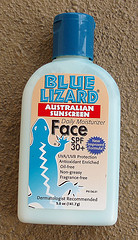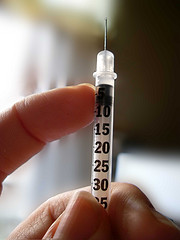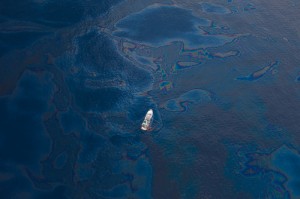Posted on 21 June 2011. Tags: broad spectrum, drug evaluation, fda, food and drug, food and drug administration, harmful rays, labels, skin cancer, sunburn, uva and uvb
 The United States Food and Drug Administration announced on Tuesday that they will require new sunscreen labelling in order to identify the products that are best for decreasing the risk of skin cancer.
The United States Food and Drug Administration announced on Tuesday that they will require new sunscreen labelling in order to identify the products that are best for decreasing the risk of skin cancer.
Based on the new rules, sunscreens that protect its users from UVA and UVB rays will be classified under “Broad Spectrum” sunscreens. FDA officials explained that both UVA and UVB rays cause skin damage; however, UVB rays are the main cause of sunburn.
Manufacturers of sunscreens will also be required to indicate sun protection factor (SPF). Those with less than SPF 15 could not claim that they help thwart sunburn, cancer, and premature skin aging.
The director of the Center for Drug Evaluation of the U.S. FDA, Dr. Janet Woodcock, said that sunscreens that meet their standards can now advertise their product as a tool that can help reduce the risk of skin cancer and early skin aging when used with other sun protection methods. The new labels, however, may not be seen until next summer, she added.
On the other hand, sunscreens with SPF of less than 14 and are not Broad Spectrum must indicate in their labelling that their product is not proven to decrease risks of skin cancer and sunburn. Woodcock also said that the said labels will be added on the drug fact box. She also said that sunscreens can no longer be referred to as “sunblocks” to avoid the impression that they offer complete protection from the harmful rays of the sun.
Posted in Health
Posted on 05 May 2011. Tags: body temperature, confusion, drug overdoses, emergency room, food and drug administration, infant deaths, infant decongestant, johnson johnson, safety instructions, tylenol
 Johnson & Johnson as well as other makers of a fever medication announced on Wednesday that they will stop producing infant drops for medicines with acetaminophen to avoid confusion that may unfortunately lead to drug overdoses.
Johnson & Johnson as well as other makers of a fever medication announced on Wednesday that they will stop producing infant drops for medicines with acetaminophen to avoid confusion that may unfortunately lead to drug overdoses.
The association that handles over-the-counter or OTC drug makers said that all of their members will discontinue liquid drops beginning later this year. After all the drugs have been successfully phased out, drug companies will only market one formula for children age 12 and below.
At present, J&J and many other drug companies sell infant formulations that have half the amount of acetaminophen compared to that found in children’s (1-12 years old) formula.
Acetaminophen is a drug component usually found in Tylenol and Nyquil; it effectively reduces body temperature and pain. Although it is safe to use in general, acetaminophen overdose is one of the leading causes of liver failure in American and it sends as much as 50,000 people to the emergency room every year.
The announcement that was released late Wednesday is in line with the Food and Drug Administration’s meeting with them scheduled on Monday. The meeting was intended for the discussion of the need for additional safety instructions in drugs with acetaminophen.
Drug makers’ move to eliminate infant formula with acetaminophen content marks the second instance that the drug industry pulled off its products before the FDA can act on it. In 2007, the same group of drug makers announced the discontinuation of infant decongestant medicines ahead of an FDA meeting that was supposed to talk about infant deaths related to the product.
Posted in Health
Posted on 04 April 2011. Tags: birth prevention, brand name, fda, food and drug administration, kv pharmaceutical company, pharmaceutical companies, premature birth, public uproar, researches, unborn child
 The price of the drug that prevents premature birth was slashed by more than 50 percent after the FDA decided to keep its cheap version available in the market.
The price of the drug that prevents premature birth was slashed by more than 50 percent after the FDA decided to keep its cheap version available in the market.
KV Pharmaceutical Company, the company that was first granted exclusive production and marketing of the same drug, reduced the price to $690, Friday.
Although $690 per weekly dose is still pricey, it is a huge improvement from its original price of $1,500. Moreover, the company said that they will give rebates and discounts to women who cannot afford the drug even at $690.
The price cut was announced only two days after the Food and Drug Administration decided to allow small pharmaceutical companies to continue making generics of the drug priced at $10. This has been the case before KV Pharmaceutical Company gained exclusive rights on selling the drug February this year.
Many doctors supported KV Pharmaceutical Co. because this can assure proper regulation of the drug and its quality. However, they were taken aback when they found out how expensive the drug will be.
FDA already said that they have no control over food and drug prices. However, following public uproar on the massive price increase, FDA announced that they will not stop other pharmaceutical companies from selling the drug.
Gregory J. Divis Jr., chief executive of KV Pharmaceutical Co., said that the price of Makena – the drug’s brand name – is justified as $1,500 is a small price to pay to ensure an unborn child’s health. He further said that they spent millions of dollars on researches conducted for drug development.
Posted in Health
Posted on 31 March 2011. Tags: cheap drugs, fda, federal health officials, food and drug administration, food and drug administration fda, pharmacies, pregnant women, premature birth, quality control, risk
 All pregnant mothers will still have access to cheap drugs that will prevent premature birth said federal health officials, Wednesday.
All pregnant mothers will still have access to cheap drugs that will prevent premature birth said federal health officials, Wednesday.
Since the $1,500 version of this drug was approved, it was unclear whether or not pregnant women will still be allowed to buy from specialty pharmacies that sell the drug for an average of $15.
Many people, doctors and pregnant women alike, reacted negatively on the drastic price increase on the drug. The Food and Drug Administration (FDA) finally said, Wednesday, that specialty pharmacies can continue to make cheaper versions of the drug that decreases the risk for preterm labor as they did for the past few years.
Many doctors welcomed the concept of the new drug because they said it can assure quality control of the drug. They were, however, shocked by the price; they simply did not see it coming. FDA said that they do not have the authority to control drug prices.
KV Pharmaceutical Co., the government-approved exclusive distribution of the drug insisted that the price of the drug is justified considering the costs of caring for a prematurely born child. They further said that they will make sure everyone who needs the drug will gain access to it. The pharmaceutical company will make a statement on drug pricing within the week.
One month ago, KV Pharmaceutical sent letters to other pharmacies creating and selling the drug for a lower price, warning them to shut down operations or else they will face the FDA. FDA initially backed this letter but did otherwise, Wednesday.
The department, however, realized how upset the public became after hearing about the 1,500 dollar drug. FDA said, Wednesday, that under this unique situation they will not take actions against pharmacies in order to ensure accessibility of the said drug.
Posted in Featured News, Health
Posted on 09 March 2011. Tags: desk reference, doctors, drugstore, fda, food and drug, food and drug administration, medication, medications, prescription drugs, reference books
 The U.S. Food and Drug Administration said on Wednesday that it wants to pull 500 unauthorized prescription drugs for allergy, cold, and cough symptoms from the market because of the health risks they might pose to the public.
The U.S. Food and Drug Administration said on Wednesday that it wants to pull 500 unauthorized prescription drugs for allergy, cold, and cough symptoms from the market because of the health risks they might pose to the public.
A list of 500 medications was released by the agency. The medications can only be obtained with a doctor’s prescription. However, the FDA has told drug companies to discontinue manufacturing those medications within 90 days and end shipping the items within 180 days.
Deborah Autor, FDA director of the Office of Compliance, Center for Drug Evaluation and Research, said that they do not know what those drugs are made of or how they are created. Also, they do not know if those medications will work properly.
She said close to if not all of the drugs are manufactured in United States. She said FDA believes many doctors continue to prescribe those medications. Some are even listed in desk reference books or advertised in journals.
Some of those drugs commonly used or sold in the market include Organidin, Cardec and Lodrane 24D. Another drug is called Pedia-Hist. The medication is not yet cleared by FDA, but it is already given to children as little as one year old.
Doctor Charlie Lee said the medications are chiefly a combination of cold and cough formulas. They have reported complications that include drowsiness, irritability and sedation.
FDA noted that the reports were still limited. It is not yet sure as to how many of the drugs were available on the market. Also, the number of people using the medication is still unknown mainly because most buy medications from the drugstore to treat the said symptoms.
Posted in Health
Posted on 29 October 2010. Tags: chemical contamination, chemical test, doss, food and drug administration, household products, human consumption, noaa, oil drilling rig, otc medications, seafood safety
 Tests have helped confirm that the chemicals used to remove oil from the BP spill have not yet reached the fish, shrimp, crabs or oysters at the Gulf of Mexico, according to the U.S. officials on Friday.
Tests have helped confirm that the chemicals used to remove oil from the BP spill have not yet reached the fish, shrimp, crabs or oysters at the Gulf of Mexico, according to the U.S. officials on Friday.
The officials from the Food and Drug Administration, as well as the National Oceanic and Atmospheric Administration said that the tests have been made in more than 1,700 samples and results show that lesser than 1 percent of the samples had any trace of the chemicals used, and the ones that did had very low levels.
Dr. Vicky Seyfert-Margolis, FDA’s senior adviser in the field of science and innovation informed that the second round of testing confirmed that the Gulf seafood brought in the market is safe for human consumption.
The BP spill occurred when the Deepwater Horizon oil drilling rig exploded on April 11. This incident killed 11 workers and spilled about 4.9 million barrels, which is equivalent to 185 million gallons of crude oil.
Sensory testing was once done by trained experts to determine the sign of chemical contamination in the seafood. The recent chemical test was done to back-up the sensory testing as informed by Dr. John Stein, NOAA’s seafood safety program director.
The chemical test looks for DOSS or Dioctyl sodium sulfosuccinate, which is the main compound found in the dispersant chemical utilized to separate the spilled oil. This is also used in a variety of household products and OTC medications at extremely low levels.
The results of the test confirm the result of the sensory testing and that the seafood samples pose no threat on humans.
Posted in Health
 The United States Food and Drug Administration announced on Tuesday that they will require new sunscreen labelling in order to identify the products that are best for decreasing the risk of skin cancer.
The United States Food and Drug Administration announced on Tuesday that they will require new sunscreen labelling in order to identify the products that are best for decreasing the risk of skin cancer.
 Johnson & Johnson as well as other makers of a fever medication announced on Wednesday that they will stop producing infant drops for medicines with acetaminophen to avoid confusion that may unfortunately lead to drug overdoses.
Johnson & Johnson as well as other makers of a fever medication announced on Wednesday that they will stop producing infant drops for medicines with acetaminophen to avoid confusion that may unfortunately lead to drug overdoses. The price of the drug that prevents premature birth was slashed by more than 50 percent after the FDA decided to keep its cheap version available in the market.
The price of the drug that prevents premature birth was slashed by more than 50 percent after the FDA decided to keep its cheap version available in the market. All pregnant mothers will still have access to cheap drugs that will prevent premature birth said federal health officials, Wednesday.
All pregnant mothers will still have access to cheap drugs that will prevent premature birth said federal health officials, Wednesday. The U.S. Food and Drug Administration said on Wednesday that it wants to pull 500 unauthorized prescription drugs for allergy, cold, and cough symptoms from the market because of the health risks they might pose to the public.
The U.S. Food and Drug Administration said on Wednesday that it wants to pull 500 unauthorized prescription drugs for allergy, cold, and cough symptoms from the market because of the health risks they might pose to the public. Tests have helped confirm that the chemicals used to remove oil from the BP spill have not yet reached the fish, shrimp, crabs or oysters at the Gulf of Mexico, according to the U.S. officials on Friday.
Tests have helped confirm that the chemicals used to remove oil from the BP spill have not yet reached the fish, shrimp, crabs or oysters at the Gulf of Mexico, according to the U.S. officials on Friday.